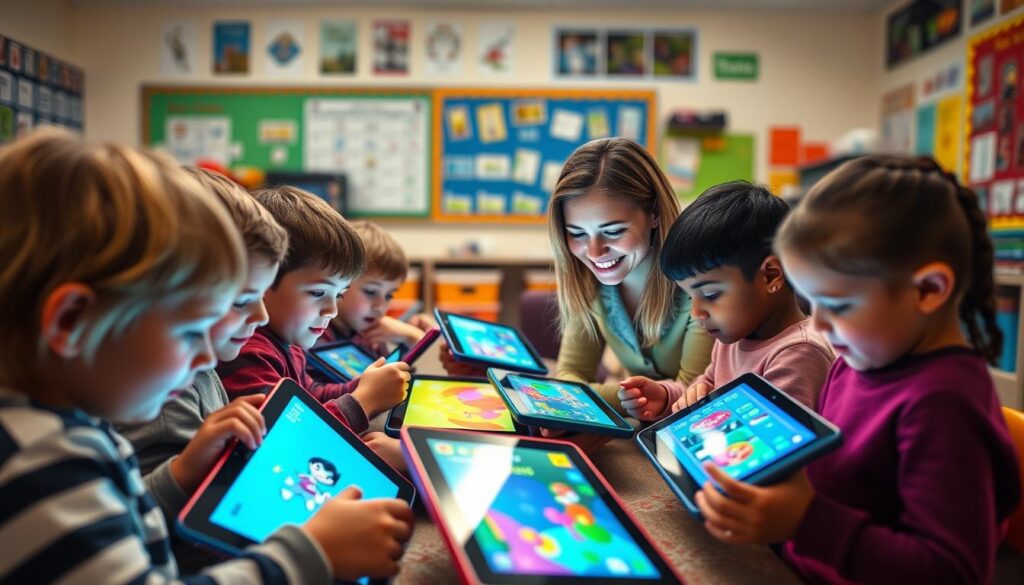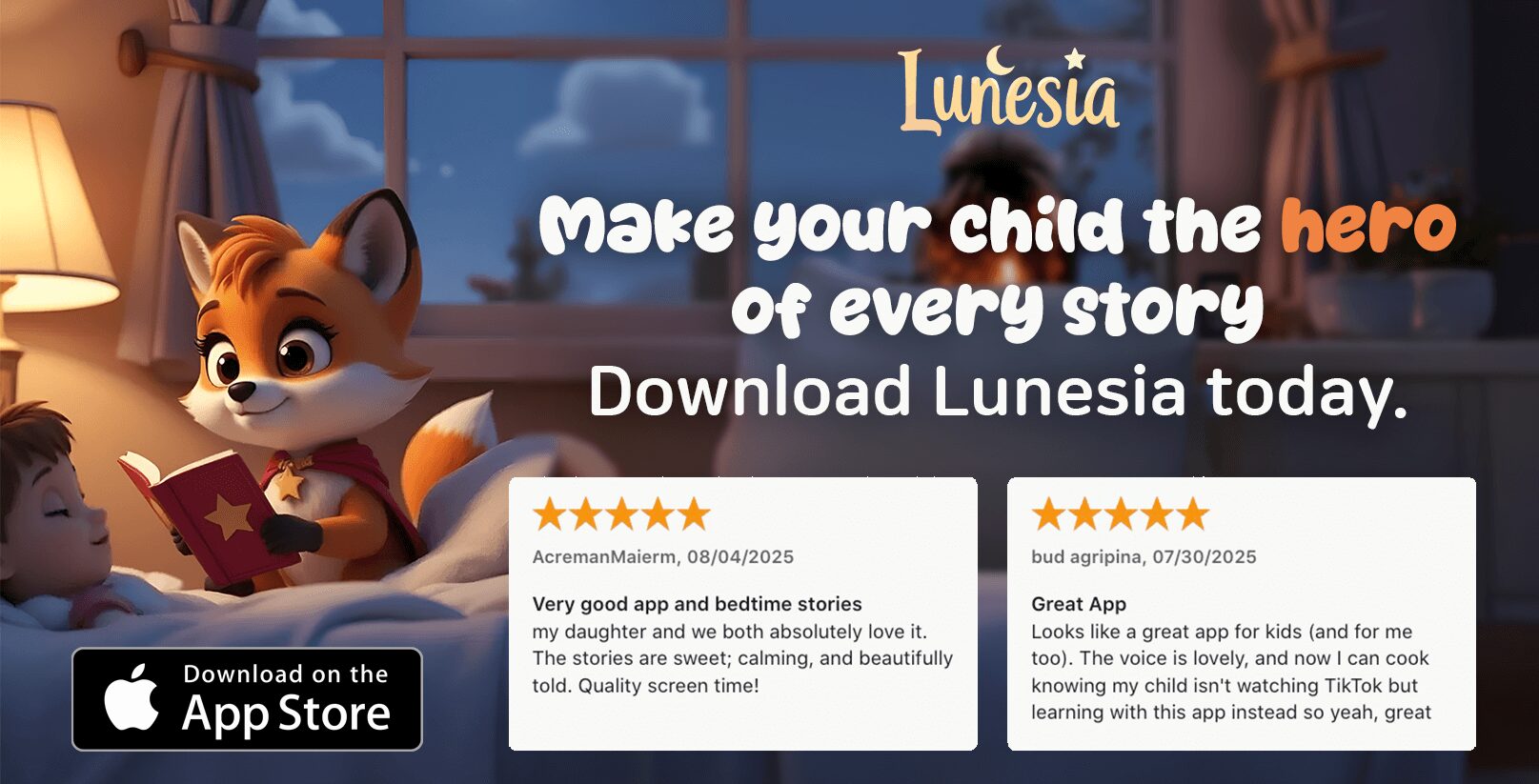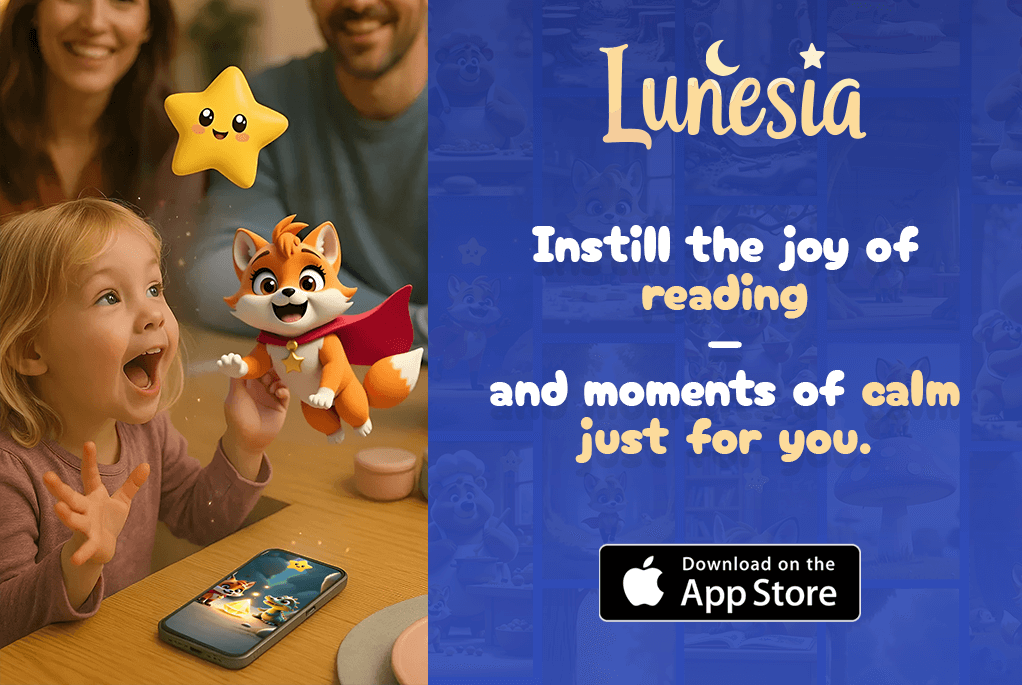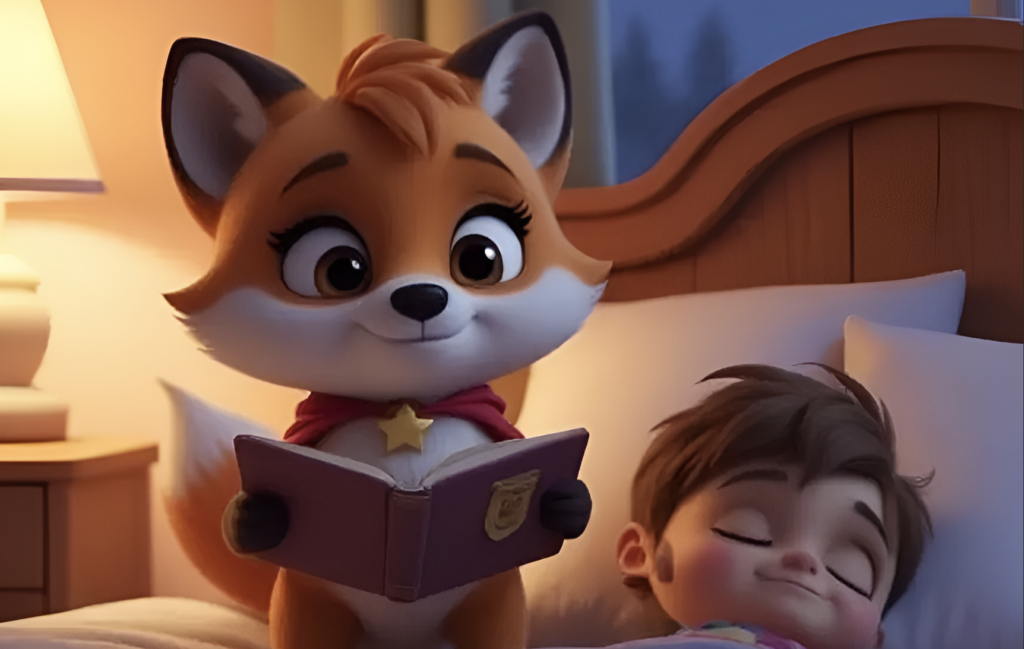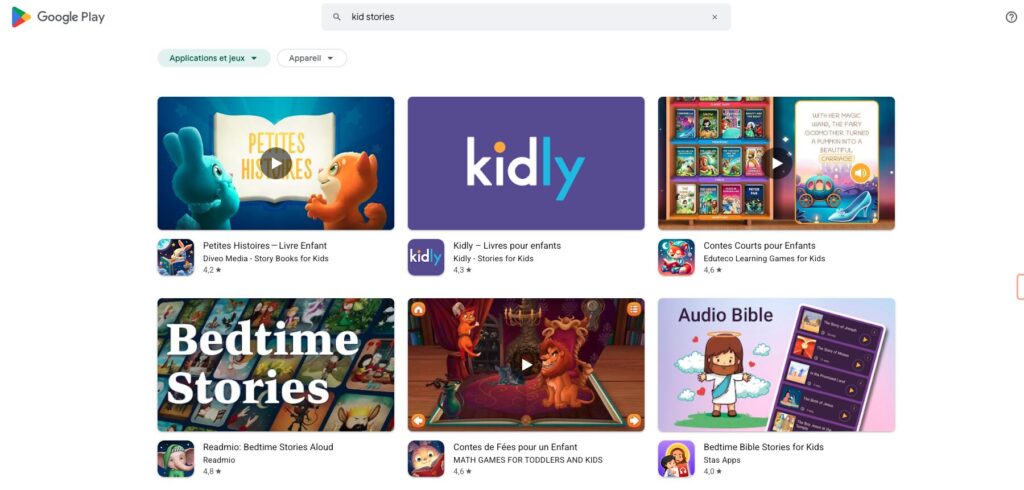As a parent, choosing the right educational app for your child can be a daunting task. With so many options available, it’s essential to consider the underlying educational philosophy that drives these digital tools.
In today’s digital age, learning experiences are being transformed by innovative apps that cater to different educational approaches. Two popular options, Lunesia and Montessori, have gained significant attention for their unique methods.
As we explore these educational apps, we’ll examine how they support children’s development and provide valuable learning experiences. By understanding the core principles behind each app, you can make an informed decision that aligns with your educational values and your child’s unique experience.
Understanding Educational Apps for Children
In recent years, there’s been a notable shift towards using educational apps to supplement traditional learning methods. As a result, it’s essential to understand the role these apps play in a child’s educational journey.
The Rise of Educational Technology in Early Learning
Educational technology has come a long way, transforming from simple games to sophisticated learning apps that cater to individual needs and learning styles. Apps like Khan Academy Kids and Funexpected Math have become increasingly popular, offering interactive activities that support skill development in young children. The digital learning landscape has expanded dramatically, covering everything from basic literacy and numeracy to critical thinking and creative expression.
How Educational Philosophies Shape Learning Apps
Different educational philosophies, such as Montessori and play-based learning, have influenced app design, impacting user interface and content progression. Understanding how these philosophies translate to digital platforms helps parents make informed choices about which educational apps truly support their child’s development and enhance their learning experience. By choosing the right apps, parents can provide their kids with a well-rounded learning experience.
Key Educational Philosophies in Children’s Learning Apps
Different educational philosophies play a crucial role in shaping the learning experience for children in educational apps. As a parent, understanding these philosophies can help you choose the right app for your child.
The traditional educational approach in apps focuses on structured learning paths with clear progression through academic content. In contrast, the Montessori philosophy prioritizes self-directed learning and minimal instruction, simulating real-world materials and experiences.
Traditional Educational Approaches
Traditional educational approaches in apps emphasize mastery of specific skills before advancing. This structured method is designed to ensure a solid foundation in various subjects.
Montessori Philosophy in Digital Learning
The Montessori method, when applied to digital platforms, focuses on self-directed learning and activities that promote hands-on experience. Montessori-inspired apps avoid excessive rewards and distractions, promoting intrinsic satisfaction.
Play-Based and Exploratory Learning Methods
Play-based learning apps integrate educational content into game-like experiences, recognizing that children learn best when engaged and enjoying the process. Exploratory learning methods encourage open-ended discovery, allowing children to experiment and learn through trial and error.
Lunesia App: Features and Educational Approach
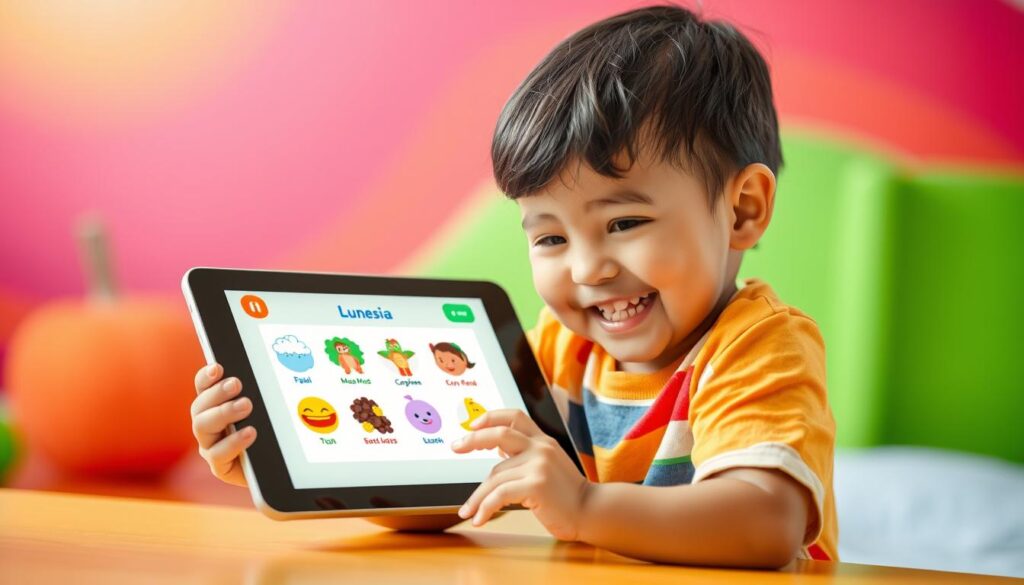
With its cutting-edge technology and research-backed methodology, the Lunesia app offers a unique learning environment for kids. The app is designed to provide a comprehensive learning experience that fosters overall development.
Core Features and Curriculum
Lunesia’s curriculum is carefully crafted to cover foundational skills across multiple domains, including literacy, numeracy, critical thinking, and creative problem-solving. The app’s adaptive learning system adjusts difficulty based on your child’s performance, creating a personalized learning path that grows with them.
Learning Methodology and Engagement Techniques
The Lunesia app employs a balanced approach to feedback, providing gentle guidance when needed while encouraging independent discovery and resilience. Its engagement techniques include interactive animations, voice guidance, and progressive challenges that maintain children’s interest without overwhelming stimulation.
Age Appropriateness and Skill Development
The activities in Lunesia are carefully designed to develop both cognitive skills and executive functions like attention, working memory, and cognitive flexibility. The app’s content is organized into developmental stages, ensuring children encounter concepts at the right time in their learning journey.
Montessori App: Features and Educational Approach
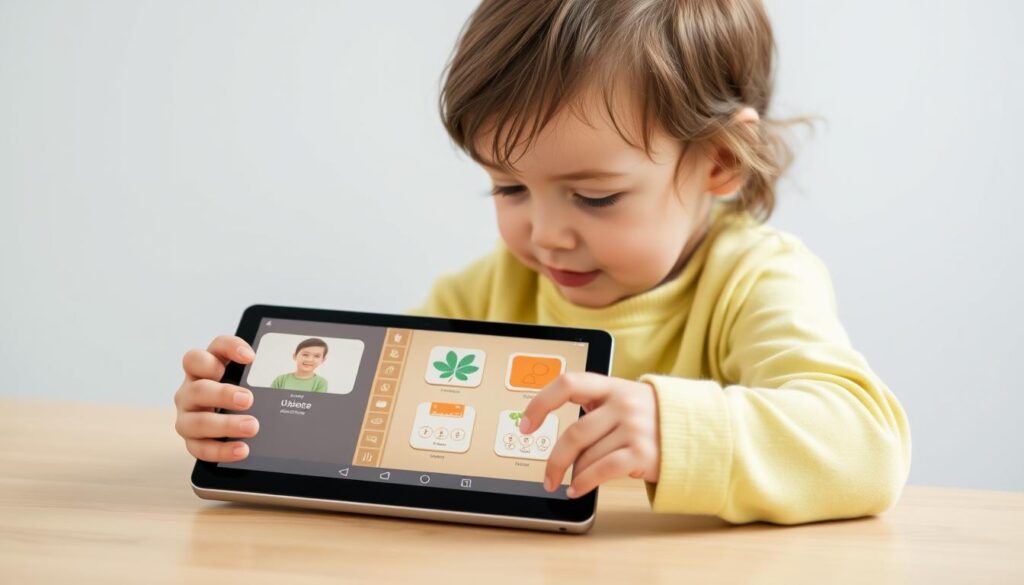
If you’re considering a Montessori app for your child, here’s what you need to know. The Montessori app offers a comprehensive learning experience that covers a wide range of subjects, from phonics and math to music and coding.
Core Features and Curriculum
The Montessori app’s curriculum is designed to be comprehensive, covering traditional Montessori areas such as practical life, sensorial, language, mathematics, and cultural studies. The app’s core features include a wide range of learning activities that make learning engaging and effective.
Montessori Principles in Digital Format
The Montessori app faithfully translates key Montessori principles into digital experiences, emphasizing self-directed learning and intrinsic motivation. The app’s interface is intentionally clean and uncluttered, mirroring the prepared environment concept central to Montessori education.
Age Appropriateness and Skill Development
The app is designed to be age-appropriate, with content divided into developmental planes that align with Montessori’s understanding of sensitive periods. The Montessori app supports skill development across multiple domains while respecting the child’s natural pace and interests.
Lunesia vs Montessori App: Direct Comparison
The debate between structured learning and self-directed exploration is at the heart of the Lunesia vs Montessori app comparison. As we dive into the specifics, you’ll see how these two educational apps differ in their approaches to child development.
User Interface and Experience Design
Lunesia offers a vibrant, character-driven experience, while the Montessori app maintains a minimalist design. This reflects their different philosophies on learning engagement. Lunesia’s interface is more playful, whereas Montessori’s is distraction-free.
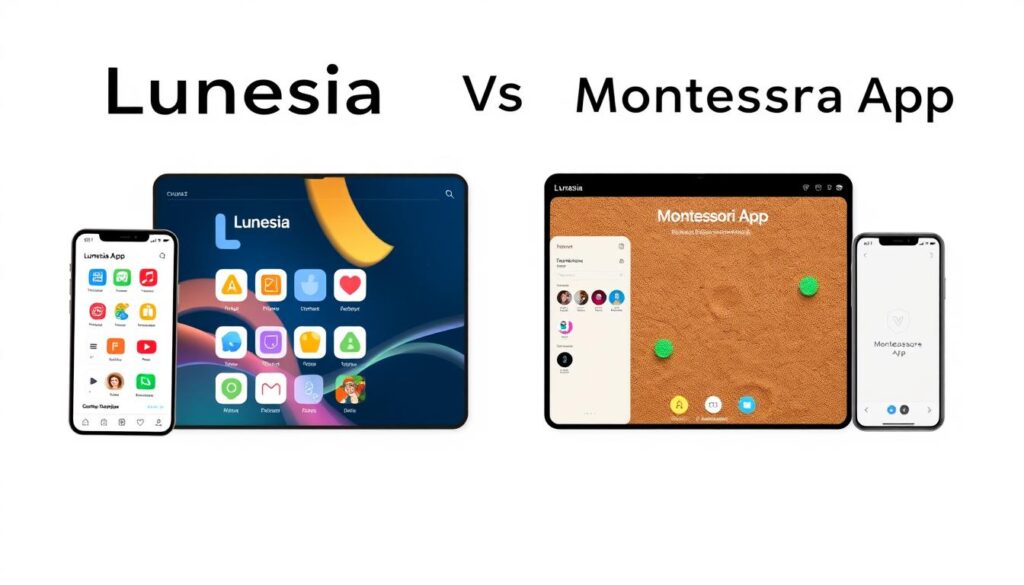
Content Structure and Learning Path
Lunesia follows a traditional educational sequence, providing a structured learning path. In contrast, the Montessori app emphasizes self-direction, allowing children to explore within curated options. This fundamental difference impacts how children make learning their own.
Engagement Strategies and Gamification
Lunesia incorporates narrative elements and character guides, making learning fun through gamification. The Montessori app, however, relies on the intrinsic interest of activities, minimizing external rewards to foster internal motivation.
Pricing and Accessibility
Pricing models vary, with Lunesia and Montessori app offering different approaches to accessibility. You can explore their pricing on the Lunesia website and compare it with the Montessori app’s offerings. For more insights on educational philosophies, visit Lunesia’s interactive learning page.
Educational Effectiveness: Research and Results
Research on the impact of digital learning tools, particularly Lunesia and Montessori apps, offers valuable insights into their educational benefits. As a parent, understanding the effectiveness of these apps can help you make informed decisions about your child’s education.
Studies on Digital Montessori Methods
Studies examining digital adaptations of Montessori materials suggest they can effectively support concept development when designed with fidelity to Montessori principles. Research indicates that children using well-designed Montessori apps show improvements in executive function, concentration, and self-regulation. For instance, a study on digital Montessori methods found promising results for translating hands-on Montessori principles to screen-based learning, particularly for certain cognitive skills.
Here’s a summary of key findings from research on digital Montessori methods:
| Cognitive Skill | Improvement Observed | Study Findings |
|---|---|---|
| Executive Function | Significant improvement | Children showed better task management and planning. |
| Concentration | Notable increase | Longer attention spans were observed in children using the app. |
| Self-regulation | Marked enhancement | Children demonstrated improved emotional regulation. |
Lunesia’s Approach to Measuring Learning Outcomes
Lunesia’s approach to measuring learning outcomes incorporates both quantitative metrics and qualitative assessments of skill development. The app collects data on completion rates, accuracy, time spent, and progression patterns to create a comprehensive picture of a child’s learning journey. Lunesia’s assessment framework aligns with established educational benchmarks while also measuring growth in critical thinking and problem-solving abilities.
For example, research indicates that just two 15-minute sessions per week with quality math apps can lead to math progress equivalent to 18 months within a 6-month period, as noted with Funexpected Math. This underscores the potential of well-designed educational apps to significantly impact learning outcomes.
“The key to effective educational apps lies in their ability to translate educational philosophies into engaging digital experiences that foster meaningful learning outcomes.”
Both Lunesia and Montessori apps have demonstrated effectiveness in supporting mathematical concept development, though they measure success through different lenses. Parent and educator feedback suggests that both approaches can be effective, with the best choice depending on the individual child’s learning style and needs.
Parental Controls and Involvement
Navigating parental controls and involvement is essential for maximizing the benefits of educational apps for your child. As a parent, you’re not just a spectator; you’re an active participant in your child’s learning journey.
Both Lunesia and Montessori apps offer robust parental controls, but they differ in their approach. Lunesia provides detailed analytics on your child’s progress across multiple skill areas, allowing you to understand their strengths and weaknesses. On the other hand, the Montessori app offers more qualitative insights aligned with Montessori developmental milestones.
Monitoring Progress and Managing Screen Time
Progress tracking is a crucial feature in both apps. Lunesia tends to be more granular, tracking specific skills and concepts, while the Montessori app focuses on broader developmental areas. For instance, Lunesia might report on your child’s proficiency in math operations, whereas the Montessori app might highlight their progress in independence and fine motor skills.
| Feature | Lunesia | Montessori App |
|---|---|---|
| Progress Tracking | Granular, skill-specific | Broader developmental areas |
| Screen Time Management | Customizable limits | Customizable limits |
| Parent Resources | Tips for extending digital learning | Background on Montessori philosophy |
Parent Resources and Support
Both apps recognize the importance of parent involvement, though they suggest different levels of direct guidance during app use. Lunesia often includes tips for extending digital learning into real-world activities, while the Montessori app provides more background on Montessori philosophy and how to create complementary learning environments at home. You can explore more about when to introduce digital learning to your child in our detailed guide: When to Give Your Child a.
Support resources include parent guides, FAQ sections, and in some cases, access to educational consultants who can help optimize the learning experience for your child. By leveraging these resources, you can ensure that you’re making the most out of the app and supporting your child’s educational journey effectively.
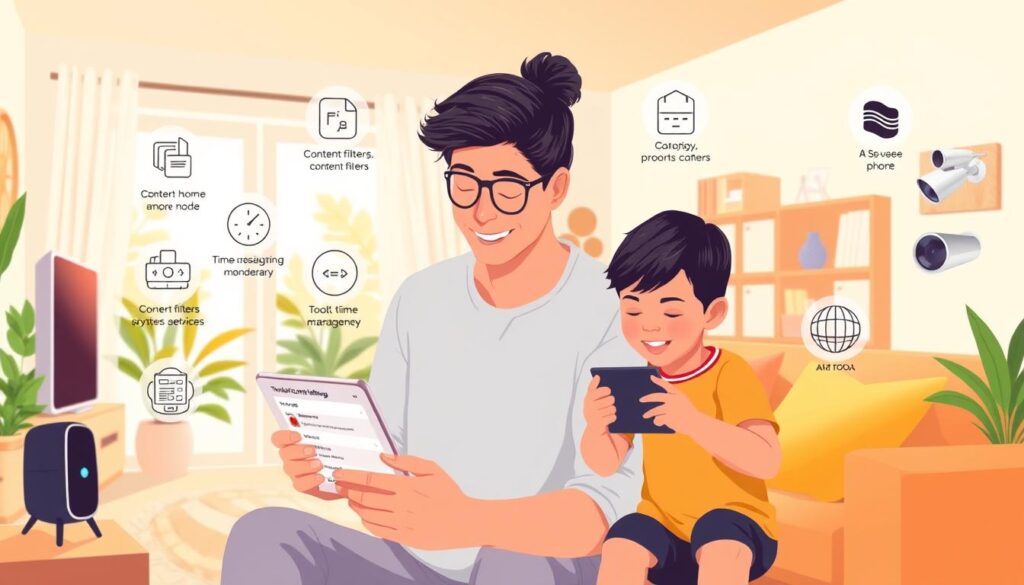
Choosing the Right App Based on Your Child’s Learning Style
Understanding your child’s learning style is key to unlocking their full potential with the right educational app. As you consider different options, think about how your child learns best.
For Visual and Hands-on Learners
For kids who are visual learners, Lunesia’s rich graphics and animated demonstrations can be particularly effective. On the other hand, children who are hands-on learners may benefit more from the Montessori app’s virtual manipulatives that encourage fine motor control.
For Structured vs. Self-Directed Learners
If your child thrives with clear structure and explicit guidance, Lunesia‘s sequential learning path might be the better choice. For self-directed learners who prefer exploration, the Montessori app’s open-ended approach could be more suitable.
For Different Age Groups and Developmental Stages
The apps serve different developmental stages in distinct ways. Lunesia provides scaffolding for younger children, while the Montessori app’s content is carefully calibrated to sensitive periods in a child’s development. Consider your child’s age and developmental stage when making your decision.
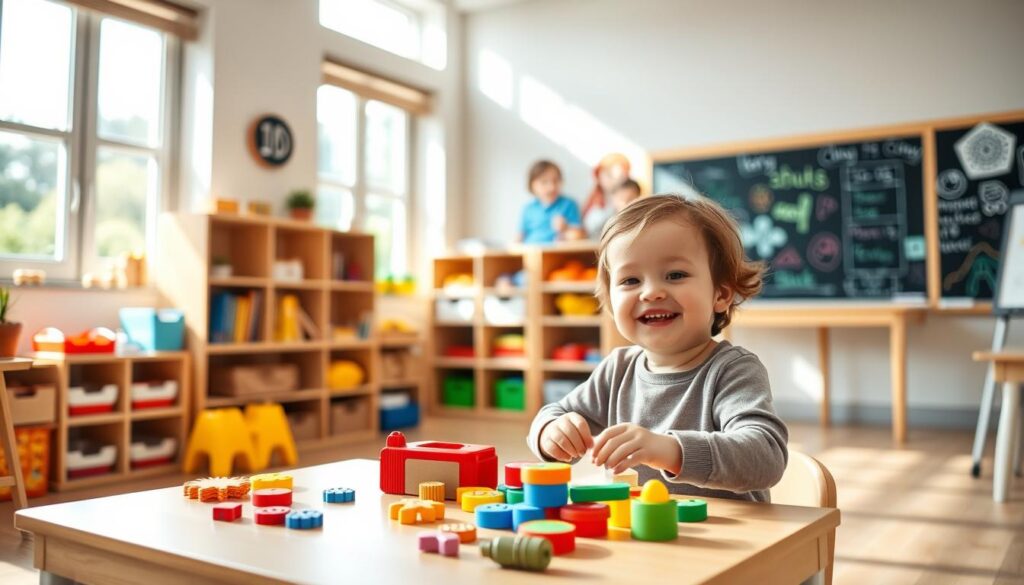
- Visual learners often thrive with Lunesia’s rich graphics and animated demonstrations.
- Self-directed learners typically respond well to the Montessori app’s open-ended approach.
- Lunesia provides more scaffolding for younger children, while maintaining engagement for older ones.
Alternative Educational Apps Worth Considering
The world of educational apps is vast, offering numerous options that can complement your child’s educational journey. As parents, it’s crucial to explore these alternatives to find the best fit for your child’s learning style.
Khan Academy Kids
Khan Academy Kids is a free app designed for children aged 2-8, offering a comprehensive curriculum that includes math, reading, and social-emotional learning. The app uses interactive games and engaging characters to make learning fun.
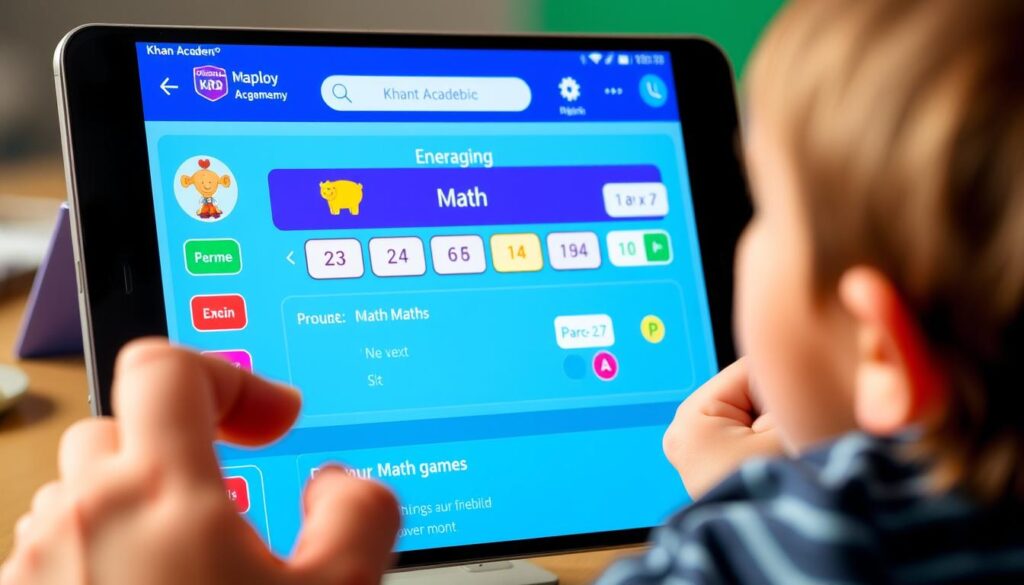
Funexpected Math
Funexpected Math is an innovative app that focuses on developing math skills in children aged 3-7. With over 10,000 math tasks and a smart digital tutor, it provides a personalized learning experience that adapts to your child’s progress.
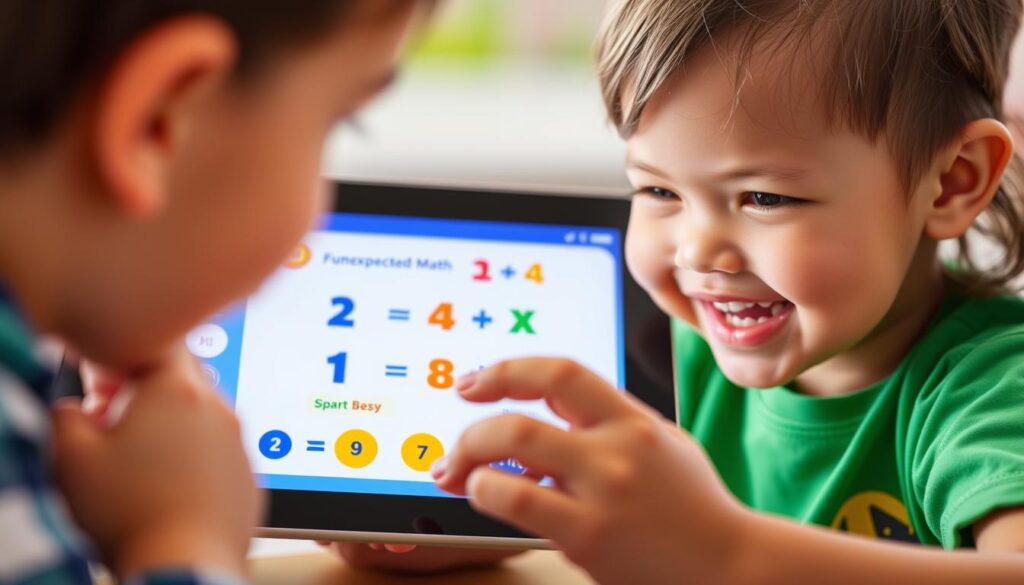
PBS Kids Games
PBS Kids Games brings beloved characters from popular PBS shows to educational games, covering various subjects including math and science. The app offers a fun and engaging way for children to learn new concepts.
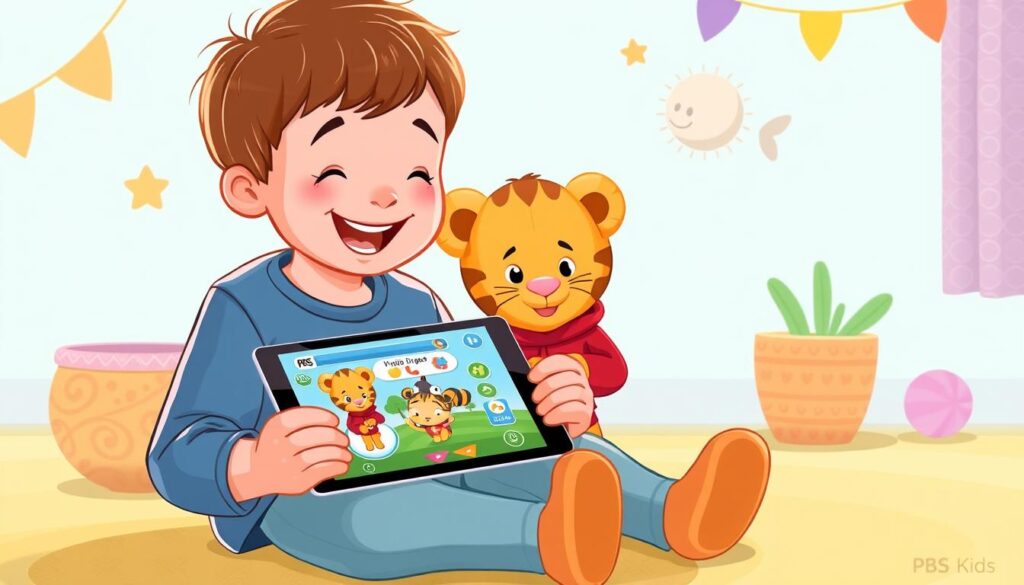
Conclusion: Making the Best Choice for Your Child’s Educational Journey
Choosing the best educational app for your child involves more than just comparing features; it’s about nurturing a love for learning. As you consider Lunesia and Montessori apps, or explore alternatives like Khan Academy Kids, remember that the best app is one that aligns with your child’s unique learning style and your educational priorities.
To make an informed decision, start with free trials to see which app captures your toddler’s interest and sustains their engagement. Combine digital tools with hands-on activities to create a comprehensive learning experience. Your involvement as a parent is crucial, so trust your observations of your child’s responses to different approaches.
FAQ
What is the main difference between Lunesia and Montessori learning approaches?
Lunesia focuses on a comprehensive curriculum that incorporates various subjects, while Montessori emphasizes self-directed learning and hands-on activities, fostering independence and critical thinking.
Are these educational apps suitable for my toddler’s development?
Both Lunesia and Montessori apps offer content suitable for young children, with engaging activities designed to promote early learning and development, including math skills and language development.
How do I track my child’s progress in these learning apps?
Both platforms provide progress tracking features, allowing you to monitor your child’s learning journey, identify areas of improvement, and adjust their learning path accordingly.
Can I try these educational apps before committing to a purchase?
Yes, both Lunesia and Montessori apps offer a free trial, enabling you to explore their features, content, and learning methodologies before deciding on a subscription.
How do these apps make learning fun for my child?
By incorporating games, interactive activities, and engaging content, both apps make learning an enjoyable experience, keeping your child motivated and eager to learn.
Are there any other educational apps worth considering for my child?
Yes, alternatives like Khan Academy Kids, Funexpected Math, and PBS Kids Games offer a range of educational content and activities that cater to different learning styles and age groups.
How do I choose the right educational app for my child’s learning style?
Consider your child’s individual needs, learning preferences, and age when selecting an app, and look for features like personalized learning paths and parental controls to ensure the best fit.
